- Home
- W. Bruce Cameron
Emory's Gift Page 17
Emory's Gift Read online
Page 17
In the end, though, I did nothing at all.
Yvonne was gone when I woke up the next morning. I went about the business of my breakfast without a word, punishing my father with silence, but it was so much like every other day I wasn’t sure he got the message. And Emory was gone, too—he’d eaten the dog food but, as I would figure out years later, needed a more varied diet than what he could get in the pole barn. As it would turn out, he spent the weekend foraging and only returned to the couch at night.
The phone didn’t ring much in the house, so when it did and I went to answer it my father followed and stood looking at me with a questioning look on his face.
I said hello and for a second there was no response, and then I heard Beth’s voice.
“Charlie?”
I waved at my dad that the call was for me. He cocked his head, not leaving, curious who it was. I turned my back on him, the cord wrapping around my torso.
“I’m glad your phone got fixed,” Beth was saying.
“What?”
“Your phone. I’m glad they fixed it. That is why you haven’t called me, because your telephone has been out of order, right?”
I found myself grinning. “Was I supposed to call you?”
“I don’t know, Charlie, were you supposed to call me?”
“Um…”
“So anyway, I was just checking to see if your phone was working. Bye, Charlie.”
She disconnected. I stared at the phone in disbelief.
“Who was that?” my dad asked.
“Beth Shelburton.”
“Oh-h-h,” he replied, drawing the word out so I’d know he was jumping to all kinds of conclusions. I felt my face flushing.
“It’s not what you think,” I told him icily.
He nodded. “Okay.”
“She was just checking to see if our phone was working.”
That one puzzled him, too. “Okay,” he said again, sounding less sure of himself.
That was Beth; she had the ability to confound even men as old as my dad.
I walked out of the kitchen as if the entire incident were behind me. I went out to the pole barn, but Emory was gone, probably out eating fifty acres of huckleberries. I scuffed my feet on the driveway a little and then went back into the house and asked my dad for the Shelburtons’ phone number.
Her brother answered and then, with a taunt in his voice, called out to Beth, telling her it was a “boy” on the phone and making all sorts of irritating love noises in the background while she picked up the receiver. There was a short scuffling that ended in a muffled gasp—it sounded as if she had hit him in the head with something heavy.
“Hello?”
“Hi, Beth.”
“Hi. Who’s calling, please?”
“It’s me. Charlie.”
“Why, Charlie, what a nice surprise!”
She just had a talent for making me grin like an idiot.
That Monday at school I determined that after English class if I sprinted I could make it to her history class and walk with her to her math class and then race back for my history class. We’d have three whole minutes of conversation together. It was clearly worth the effort.
The novelty of having a boy call quickly went away for her little brother, since I had rung Beth six or seven times that weekend. We talked about a lot of things, but we didn’t talk about Emory, or about my mother, or about Dad and Yvonne. I wanted to, though. I was ready to confide in Beth, but the truth is that she kept me so off balance I never felt like the conversation was mine to control.
I was on the phone with her when my dad came home Monday evening. He hadn’t said anything about my sudden fondness for telephonic communication, but he couldn’t help but notice all the activity, since the only place I could talk from was the kitchen. I planned to ask for a telephone in my room for Christmas.
I heard a car pull in our driveway, but Beth was telling me something about gymnastics, so I left it up to my dad to investigate. He went to the front window, then turned and looked at me.
“You’d better get off the phone.”
I said a reluctant good-bye to Beth and hung up, joining my dad at the window. What I saw made my heart freeze in my chest.
Herman Hessler, the Fish and Game agent, was back, and he had two more agents with him. There was also a sheriff patrol car.
The Fish and Game agents had rifles.
chapter
TWENTY-THREE
THE expression on my father’s face and the stiff set to his spine as he opened the door to confront the Fish and Game agents was very familiar to me. I’d seen it more than once as my father had headed in to see Mom’s doctors. He was ready for the worst, steeled against it.
We stepped outside together. “Herman,” my father greeted softly.
Mr. Hessler started tossing his hat. “Hey there, George.”
“So,” my dad said.
Mr. Hessler nodded. “The Alderton boy won’t let it go. He contacted the, the…” He turned to one of the men holding a rifle. “What is it?”
“Idaho Guild of Animal Rights,” the man said. “IGAR.”
“Yeah, the Idaho guild for the rights of animals, and they filed a, uh, an action.” Mr. Hessler nodded at the sheriff’s deputy, a big guy with doughy skin, who stepped forward and stiffly held out a piece of paper for my dad to take.
“You’re George Hall?” the deputy asked, which was silly because everyone in Selkirk River knew my dad. My dad nodded and took the paper.
“So we’ve got that warrant to search the premises and determine if you’re harboring a wild animal against the law,” Mr. Hessler said.
“What are the rifles for?” my dad asked.
Mr. Hessler looked uncomfortable. “Well, you know, just in case.”
My dad shook his head. Mr. Hessler shrugged. “I’m sorry about this, George. I’d just as soon not be here, but I have to do my job.”
I left my father’s side and headed over to the pole barn. “Charlie!” my dad called, but I didn’t look back.
Emory was pacing back and forth. Clearly, he’d heard the men on the other side of the door—did he understand what was happening? “I’m not going to let anything happen to you, Emory,” I whispered. I walked over to him, close enough to feel the heat coming off his body, and turned and faced the front.
When the door ratcheted up I was between the men with the guns and the bear, my arms folded. The startled tension that went through them was almost comical, but there was nothing funny in the way they all reflexively jacked shells into their rifle chambers.
“Charlie. Come away from that animal,” Mr. Hessler ordered. One of the men raised his rifle and sighted at Emory behind me and my father moved in a blur, shoving the rifle up in the air.
“Do not point a gun at my son!” he barked.
The deputy sheriff put his hand on his pistol and everyone looked scared and angry. Mr. Hessler set his hat on his head so he could have both hands free to raise up in front of him. “Hold it, everybody. Let’s not escalate this thing. Hold on.”
Everyone relaxed a little but still looked wary. The man who had pointed the gun seemed a little embarrassed when Mr. Hessler glared at him. Then the Fish and Game agent turned to my dad. “George, that’s a full-grown grizzly bear.”
“Yes, it is. And you’ve determined that it’s here, so your work is done,” my dad responded coolly.
Mr. Hessler thought about this, dourly regarding his fellow Fish and Game agents, who both appeared to be in bad moods. “I can’t just walk away, now that I’ve seen him, George. It’s against the law to harbor a wild animal; you know that.”
“Herman, does that look like a wild animal to you?”
As if to help illustrate the point, Emory stretched his neck and sort of set his giant head on my shoulder. The weight of the thing almost made me collapse, but I shifted and kept my balance.
“Not legal to keep a tame one, either,” Mr. Hessler observed. He pulled his hat off his h
ead and started flipping it in his hands again. He probably wore out three hats a year with all the abuse he gave them.
“We’re not keeping him. We leave the door open. He comes and goes. We didn’t raise him and I never chose to have him show up. He chose us, or chose Charlie, anyway.”
Emory yawned, lifting his head off my shoulder as he did so.
Mr. Hessler nodded. He turned to his men. “I guess we’d better bump this one up the chain of command.”
The men looked a little disappointed that they wouldn’t get to shoot anything, but they carefully disarmed their weapons and got back in their vehicles. Mr. Hessler didn’t say anything else, but he raised his hand at my dad as he backed out of the driveway.
My dad turned to me. “Did you not hear me call you when you ran for the pole barn?”
I dropped my eyes. “Yessir. But Dad, they were going to shoot Emory!”
My dad sternly put his hand on the same shoulder where Emory had placed his head. It felt just as heavy. “Charlie, look at me.”
I managed to raise my eyes to his.
“The only way we’re going to make it through this thing is together, understand? No more running off to do things on your own.”
I swallowed and nodded.
My dad regarded Emory, who was just standing there listening. Did the bear understand what had just happened? Could the bear comprehend our conversations? My dad opened his mouth as if to speak to Emory directly, then closed it again, unwilling to let go and plunge headfirst into the fantastic.
All I cared about was keeping everything about Emory secret. If it hadn’t been for McHenry and his dogs and maybe the chance viewing by Dan, I’d still be hanging out with my grizzly bear at the creek and no one would be the wiser. That’s what I believed, anyway.
After the confrontation with the law, it took a while for us to get back to feeling normal. To work off excess energy, my dad decided to tackle cleaning the house, something I preferred to regard as a spectator sport but which my father saw as very much a team effort.
By the time I was released from the housework squad it was too late to telephone Beth, and I went to bed feeling like a kid who had missed Christmas.
The next evening Mr. Hessler was back, as was the big, fleshy deputy. It was just the two of them, and they came to our front door and the deputy handed my dad another piece of paper after first asking him if he was George Hall, which was even more stupid than last time because now we all knew he knew.
“The people from IGAR, the Idaho animal guild or whatever they call it, they’re keeping the heat on,” he told us. “That’s a subpoena for you to appear tomorrow in front of a judge for a hearing about your bear.”
Despite what had to be years of practice at flipping his hat, Mr. Hessler dropped it, so that he had to bend over to pick it up. As he stood, he met my dad’s eyes with obvious reluctance. “You might want to call a lawyer.”
“I can’t really afford a lawyer, Herman.”
“Well, shoot, George. They might levy a fine on you. There’s even … I mean, you could wind up going to jail.”
I gasped.
My dad firmly shook his head. “No, I don’t think so. The bear comes and goes; I told you that. Wouldn’t be right to put a man in jail for an animal coming out of the woods to hang around on his property. I had a herd of deer standing in my driveway this spring when I came out to get the newspaper; you going to arrest me for that? Probably get me on multiple counts; there had to be thirty of them.”
Mr. Hessler sighed. “Come on, George.”
I realized then that my dad was angry. He kept such a tight leash on his feelings it was sort of hard to tell, but his eyes were cold and his conversation unfriendly. He looked down at me. “Charlie, go open the pole barn door.”
Mr. Hessler stopped flipping his hat. The deputy looked a little pale, his hand drifting toward the gun in his holster as I dashed off the porch and ran over to the pole barn. I lifted the door and it rattled up loudly, stopping with a crash.
Emory was gone. He’d been out all day.
I walked back over to where Mr. Hessler was regarding my father with wary eyes. The deputy’s big shoulders had slumped and some color was coming back into his face.
“See? The bear comes and goes,” my dad said evenly.
“It’s not up to me; it’s the judge and these people from the guild of the Idaho animals.”
“IGAR,” the deputy corrected.
“Whatever it’s called,” Mr. Hessler snapped.
“I’ll see you in court then,” my dad said. He didn’t seem angry anymore, just resigned.
“All right then,” Mr. Hessler said.
As the cars drove off, Mrs. Alderton came up Hidden Creek Road, her son Dan in the passenger seat, looking out. His eyes swept over mine, then were riveted on the barn, still gaping open and empty. Then he looked back at me, and our gaze locked until the car bounced on up the road and out of sight.
I will fight you, Dan, I said to myself. My fists clenched themselves.
Emory didn’t come back until after my bedtime, which I found so frustrating. Didn’t he want to be with me?
Obviously I wasn’t going to school the next day. Instead, my father woke me before dawn and instructed me to put on my suit, which I had worn exactly once before—when we buried my mother. There was still a copy of the service handout in the jacket pocket, all rolled up and stressed from where I had twisted and squeezed it. I threw it away because I had several of them in pristine shape and wanted to get rid of things that I had touched on that day. I would have tossed the suit itself in the trash, even, though instead I just stared at myself in the mirror and tried not to think too hard about the last time my reflection had been dressed like that.
We had a long drive to get to the hearing, a drive through some of the most beautiful country in the world, in my admittedly not-well-traveled opinion. The town of Selkirk River is in a basin that was blasted out of the mountains by an astounding series of prehistoric floods that violently re-formed the terrain when gigantic ice dams gave way during the Ice Age. The wave was said to have been eighty feet tall, containing two and a half trillion tons of water and carrying the strength of all the rivers of the world combined. Boys in my school liked to brag about this event as if it were proof of how tough a people we were, as if our ancestors survived the deluge by clinging to trees or something.
Selkirk River was unique among the towns in Boundary County because it was on the west side of the Selkirk mountain range, the only town in the county that was thus situated. It was mainly a logging town, with a single highway in and out of it that thundered with trucks barreling along with massive logs on their rigs.
Boundary County is so-named because it is on the boundary of every place that isn’t Idaho—Canada, Washington, and Montana. That makes it sound bigger than it is, up in the Idaho Panhandle, but it really feels huge when you drive from Selkirk River to the courthouse in Bonners Ferry because the only way to get from one to the other is to drive all the way south to Sandpoint and then go east and north back up to get around the Selkirk Mountains, sort of like a boat going around the tip of Florida.
This meant my dad and I had a lot of time to ourselves as the Jeep’s knobby tires growled along on the highway. “I don’t know what’s going to happen, Charlie,” my dad said in response to my anxious questioning. “All we can do is tell the truth. The judge will decide what is right.”
This sounded an awful lot like the doctors will know what to do and in the end I’d wound up wearing this suit and watching them lower a shiny box into a hole. I took a deep, shuddering breath.
“Will we have to witness?” I asked.
“Testify, you mean? I think probably yes,” my dad responded.
“Even me?”
“Well, I don’t know. You’re a minor, so maybe not.”
“What happens if I testify?”
“Well, they’ll swear you in, and then I imagine they’ll ask you questions and you’
ll answer them the best you can.”
“Swear me in?”
“You have to tell the truth, the whole truth, and nothing but the truth.”
I chewed on that a bit. I had gotten pretty good at telling something far short of the whole truth. Though I really didn’t have anything to hide.
The whole truth. What would that be like, to allow the ice dam to fail inside me and let all two and a half trillion tons of guilt flow out? Just say it, tell everything, let my father know what I’d done.
I guess something was written on my face, because my father was giving me a curious look. “What is it?”
“Nothing.” I looked out the window.
My dad assessed my expression and decided we should pull over onto the shoulder. He put the Jeep in neutral and set the parking brake, twisting so he was facing me square, his features grim. “Charlie? What are you hiding from me?”
It wasn’t as if he looked welcoming, or forgiving, or kind. His eyes had that steely coldness in them that I knew so well. I felt my anger rising in response.
“Nothing!” I shouted. Then I gasped at how much raw pain had come out with that one word. My emotions were betraying me. My dad watched the conflict working on my face, his eyes growing sympathetic. He put a tender hand on my shoulder and it broke me.
“Dad.” I started weeping, then. I pressed my palms to my face.
“Charlie? What is it? You can tell me.”
He waited solemnly and patiently while I fought for control. It took me a full minute before I could trust myself to speak without crying. “Dad, the day that Mom went to the hospital for the last time. You went to get some medicine and you told me to watch her.”
“I remember.”
Of course he remembered; no one would forget that day.
I couldn’t bear to look at him. “I got bored. So I was looking around, and I found the little box stuck to the underside of your nightstand. I found the key to the gun cabinet. And I went out into the living room and I took your guns out.”
“My guns?” Dad repeated. He seemed both mystified and angry at me, but it wasn’t his anger that worried me, not about this, anyway.

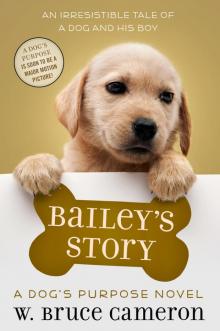 Bailey's Story: A Dog's Purpose Novel
Bailey's Story: A Dog's Purpose Novel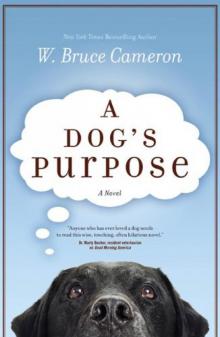 A Dog's Purpose
A Dog's Purpose Ellie's Story
Ellie's Story A Dog's Way Home
A Dog's Way Home Molly's Story
Molly's Story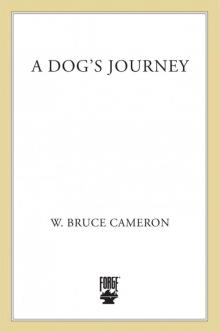 A Dog's Journey
A Dog's Journey The Dogs of Christmas
The Dogs of Christmas A Dog's Perfect Christmas
A Dog's Perfect Christmas Lily to the Rescue: Lost Little Leopard
Lily to the Rescue: Lost Little Leopard Bella's Story
Bella's Story Lily to the Rescue
Lily to the Rescue Lily to the Rescue: The Not-So-Stinky Skunk
Lily to the Rescue: The Not-So-Stinky Skunk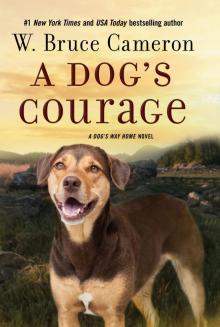 A Dog's Courage--A Dog's Way Home Novel
A Dog's Courage--A Dog's Way Home Novel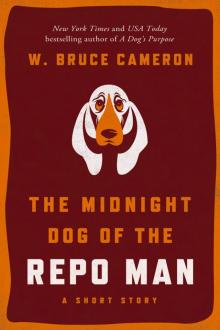 The Midnight Dog of the Repo Man
The Midnight Dog of the Repo Man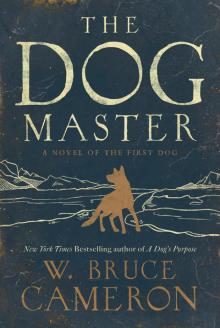 The Dog Master: A Novel of the First Dog
The Dog Master: A Novel of the First Dog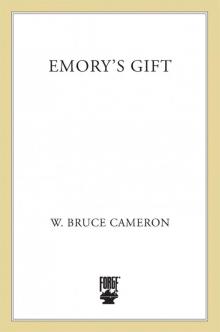 Emory's Gift
Emory's Gift Lily to the Rescue: Two Little Piggies
Lily to the Rescue: Two Little Piggies Lily to the Rescue: The Misfit Donkey
Lily to the Rescue: The Misfit Donkey Lily to the Rescue: Foxes in a Fix
Lily to the Rescue: Foxes in a Fix Lily to the Rescue: Dog Dog Goose
Lily to the Rescue: Dog Dog Goose Max's Story
Max's Story A Dog's Purpose Boxed Set
A Dog's Purpose Boxed Set Toby's Story
Toby's Story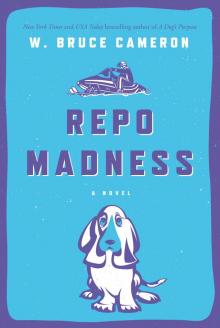 Repo Madness
Repo Madness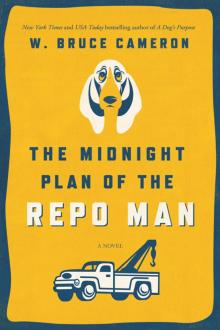 The Midnight Plan of the Repo Man
The Midnight Plan of the Repo Man Shelby's Story
Shelby's Story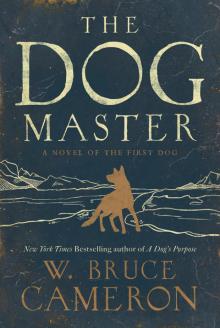 The Dog Master
The Dog Master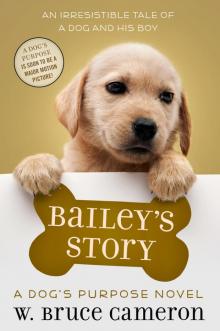 Bailey's Story
Bailey's Story